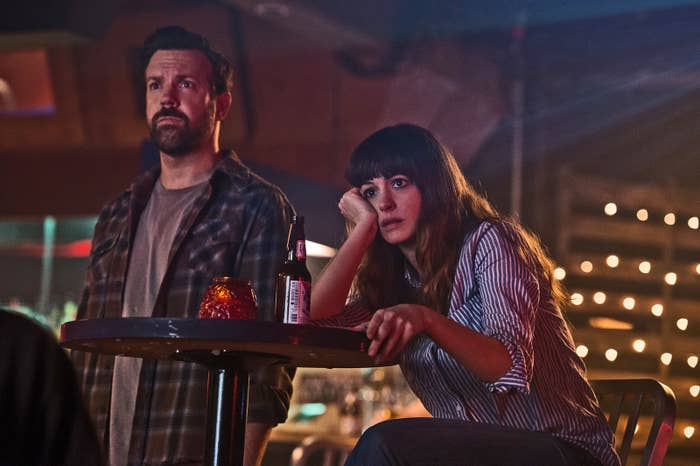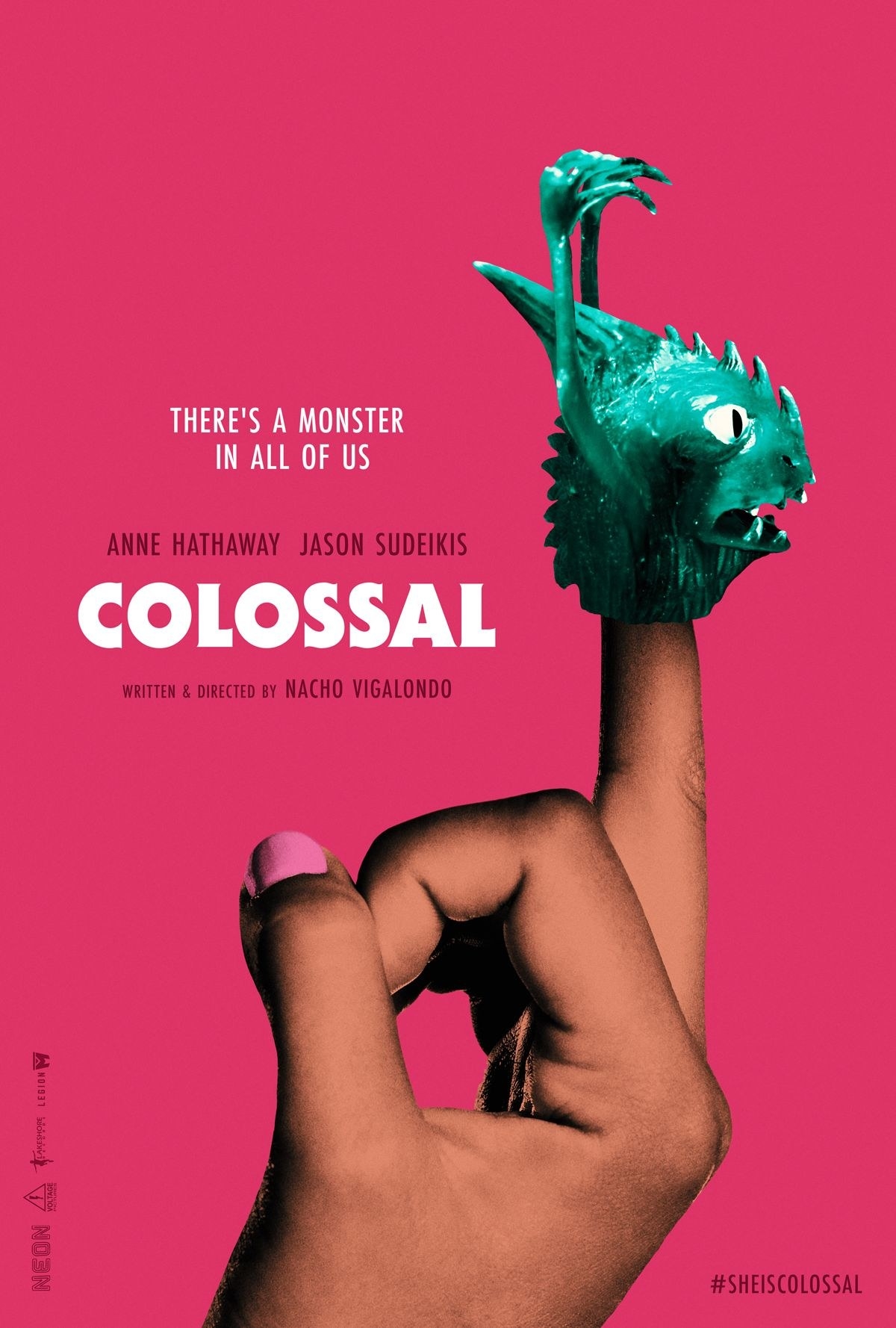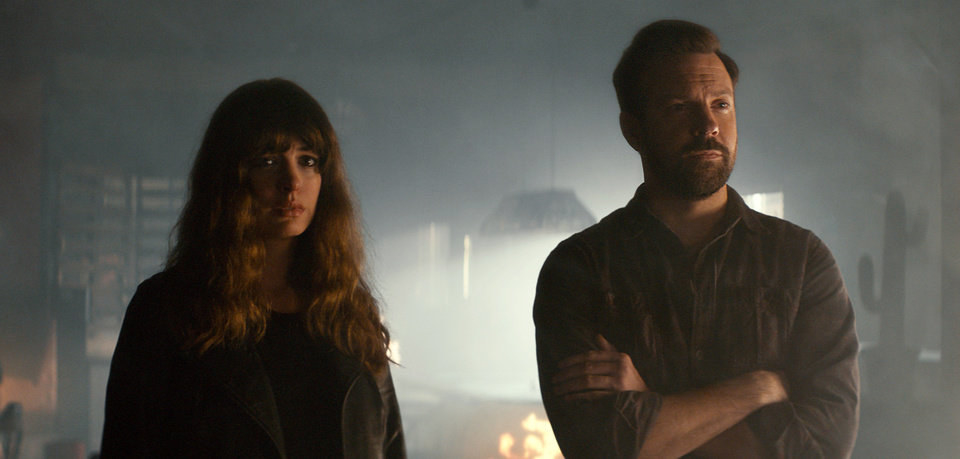
Colossal, the new indie directed by Nacho Vigalondo and starring Anne Hathaway and Jason Sudeikis, is a darkly comic take on the kaiju genre we know from films like Godzilla and Mothra. In Colossal’s first act, Hathaway’s character, Gloria, discovers she has mysterious control over a giant monster who’s been materializing over Seoul; the creature wreaks havoc on the city every time Gloria gets blackout drunk. That’s all in the trailers. But what the film’s promotional materials don’t show you is that Colossal uses its metaphorical extremes to take on what can happen when men get wrapped up in their own toxic insecurities and entitlement. It’s a theme that takes the place of the film’s literal monster to become Colossal’s driving source of tension. What we really have here is a movie that slays nice-guy syndrome right in front of us.
When introduced, Gloria is an alcoholic, jobless internet writer whose disapproving boyfriend Tim (Dan Stevens) has run out of patience with her. He kicks her out after one of her all-night benders, and with nowhere else to go, Gloria returns to her vacated childhood home. That’s when she runs into Oscar (Sudeikis), who owns a bar in town and offers her a job and a trio of friends to cushion her fall from grace. They’ve known each other since they were kids but haven’t seen each other since Gloria moved away; he’s been keeping tabs on her from afar, and compliments her on making it out of their small town and on beating him that one time in an elementary-school writing competition. He also showers her with gifts, including a giant television and a futon to furnish her empty house. Played by Sudeikis with the same geniality he’s had from 30 Rock to Tumbledown, Oscar is overflowing with niceties.
He’s the manifestation of what Sudeikis himself referred to as the “fragile masculine ego.”
But as Colossal goes on, Oscar slowly turns, revealing a man ruled by possessiveness, jealousy, and self-hatred. Those traits curdle within him until, in the film’s final act, Oscar strikes out in a truly eerie way. He’s the manifestation of what Sudeikis himself referred to as the “fragile masculine ego.” He saunters onto the scene like a friend and ally, but there’s a creeping feeling that accompanies his apparent hospitality, and it’s a familiar one. When Oscar turns on Gloria, it’s a twist — but it’s also a story many people, women especially, know all too well. “I think that’s how real life works somehow,” Vigalondo told BuzzFeed News in late March. “When you suffer these kinds of relationships, that is something that is not announced.”
“It was fun to use that exposition that I have now acquired as an artist, and sort of play against that,” Sudeikis told BuzzFeed News. “[It was fun] to be this person the entire time, and live out this fractured soul within the same vessel.”
Struggling with the discovery that she has control over a giant mystery creature that’s been racking up casualties in Seoul, Gloria shares her secret with Oscar and their friends (Austin Stowell and Tim Blake Nelson) in a drunken moment. But they all learn something new that day: Gloria is not the only one who can unwittingly summon a monster. Oscar can too, in the form of a giant robot that towers over Seoul right next to Gloria’s — and he’s not as eager as she is to relinquish his newfound power and put a stop to the terror being inflicted on the city.

“For Anne, this was a movie about alcoholism. For me it was a movie about self-loathing and what happens when you do have that power,” Sudeikis said.
The Oscar in the first half of the film gives Gloria that aforementioned television and futon seemingly out of the goodness of his heart. The Oscar in the second half gives her an entire van of antiques to furnish her house — an attempt to make amends after pushing her and killing hundreds of people with his giant robot creature. “It’s the same character, that’s the thing,” Vigalondo said about the man we meet in the first half of the movie, versus the one who lashes out in the second. “There are not two Oscars.”
Oscar’s discovery of his own strange, grandiose ability dislodges something within him: a toxicity that had long been looking for any excuse to get out. It’s a metaphor the film revels in. “In America, as a straight white man, you’re given that power from the get-go in a lot of instances,” Sudeikis said. “And yet, when you add on to that power... That’s [like Abraham Lincoln said]: ‘Any man can overcome adversity, but if you want to test a man’s character, give him power.’”
Gloria, after discovering her own connection to her monster, tries to get sober and separate herself from her all-nighters binge-drinking at the bar — an attempt to put a stop to the terror her drunken actions had been inflicting on Seoul. Witnessing her regaining independence, Oscar gives her a choice, if you can call it that: She can go wherever she wants, do whatever she wants, move back to New York even — but for every day she doesn’t report to him at the bar, he’ll exercise his connection to that giant robot and kill hundreds of innocent people.
“I know you think everything revolves around you, but it doesn’t anymore,” he says to her. “My life is just as amazing as yours now, for once.” He follows this statement with a telling declaration: “I’m done being Mr. Nice Guy.”

It’s a moment that plays like an aftershock — or contemporary-shock — from cultural conversations that have been going on for years, especially around the idea of “Nice Guys™,” who conceal roiling toxicity and entitlement under a thin layer of camaraderie. “It’s funny, because some people when they talk to me, the big discussion of the film is whether Oscar’s turn is abrupt or not,” Vigalondo said. “And this journalist, this woman, she told me about the red flags that she felt in the first half. The film is filled with red flags. And I wasn’t fully aware of those, but they’re definitely there.”
By the time Oscar’s true ugliness becomes absolutely unignorable, Gloria has already been grappling with her own faults. The tension of the final act hinges on how — or if — Gloria can find a way to both free herself from his grasp and put a permanent stop to the terror in Seoul. “I don’t know if it’s because I’m a woman or just a breathing human being in the year 2016,” Hathaway said to Film School Rejects, talking about Colossal last year. “I just found it right to see a woman pull herself out from under traditional male bullshit.”
For Vigalondo, the core of the film is the dynamic between a woman and a man who are both battling different demons. Gloria is trying to find her footing after a tailspin of alcoholism; Oscar is succumbing to the fragility of his own ego. “I was fascinated by both of them, so I wanted to see how that confrontation went,” Vigalondo said. It’s in the film’s final act that the conflict between the two comes to a head. It’s a series of sequences searing in their horror-movie scariness and in their heightened portrayal of a familiar story: that of a “nice” man gone bad, and of the woman who has to figure out how to survive him. The monster at the heart of Colossal may not be the towering creature most prominently advertised in its trailers. But the one that does sit at its center is a recognizable kind of rot — and one that Colossal takes great joy in slaying.
